- Home
- Steve Hockensmith
Dawn of the Dreadfuls Page 13
Dawn of the Dreadfuls Read online
Page 13
THE BARON OF LUMPLEY awoke with his arms around one of his hounds and a pile of empty gin bottles nestled against his back. He felt blearily around the bed for the chambermaids, but the only naked rump to slap was his own.
Then he remembered.
He’d been wrestling around with Yvonne, Yvette, Ywhat-have-you, the French one, the night before. She was a slender little doe-eyed thing with dark curls and milky skin and, most appealing of all, an almost complete inability to speak English. Only the baron had rolled over her a little too roughly at one point, his lordly girth flattening her, forcing the air from her lungs, and she’d wheezed out a sound that needed no translation: “Ohhhh!” And when he’d glanced down at her, it hadn’t been Ywhoever he’d seen beneath him.
It was Emily Ward.
How easily he’d forgotten that name just a few weeks before, as he’d let so many names flit from his memory when they (and their bearers) no longer served a purpose. Yet now he couldn’t forget it no matter how hard he tried, and the same was true of the face that went with it. The faces, really—one pert and pretty, the other puffy, putrescent.
“Go! Get away from me! Leave me alone!” he’d howled, pressing his hands to his eyes, and the chambermaid had shrieked and snatched up her clothes and scurried from the room, leaving him to greedily glug down more gin until he collapsed into dreamless oblivion.
And now he was awake again—sort of. But why why why? Being awake meant being aware, and that was the exact thing he didn’t want to be.
There was a soft knock on the door, and the baron lifted his head off his pillow—or was it another dog?—and spoke the first words of a new day.
“Hmf ibbit?”
“It’s me, Milord. Lucy. Belgrave sent me up to see if there was anything you’d be needing right about now. Or wanting.”
Ahhhhhhh, Lucy, she of the hips as wide and sturdy as the White Cliffs of Dover. She was an old favorite of his. Belgrave, God bless the man, was trying to cheer him up.
Yet for once the thought of her did nothing to rouse him, and he remained stretched across his bed like a beached whale.
“Guh awuh,” he said.
“As you wish, Milord.”
A while later—ten minutes, perhaps, or maybe two hours, Lord Lumpley neither knew nor cared—he pushed himself up and, resenting every second of his labors, pulled on a stained and wrinkled robe. Then he shuffled to a pair of double doors, threw them open, and stepped out onto a balcony overlooking Netherfield’s long, lush front lawn.
It was another bright-sunny day in what seemed like an infinite succession of them, and the baron knew he should be out and about making the most of it. There was so much he could be doing! Racing over the roads in his cabriolet, whipping his horses, terrorizing the locals. Wasn’t that just what he needed? Wouldn’t that bring him roaring back to life?
Lord Lumpley was still squinting, watering eyes adjusting to the light, when a shimmering figure moved out of the trees lining the lawn. With his first blink, it took shape: a girl in white, ghostly pale except for the scarlet splotches around her mouth and hands.
With his second blink, she was gone.
The baron cursed. He couldn’t even step outside without seeing things.
Blast those damned dreadfuls! They had him so unnerved he wasn’t having any fun!
After the debacle with the hunt, he’d written his old friend and mentor the Prince Regent asking for guidance—perhaps even protection. Yet he’d received no response, and Belgrave had informed him that the posts had grown exceedingly spotty of late, with no word from outside Hertfordshire in some days. He was tempted to hop into the cabriolet and make for London and never look back.
Everyone agreed there was no cause for alarm yet, though. (“Everyone” was Belgrave, whose job it was to agree.) A few dreadfuls had popped up and been handily dealt with. What of it? For that he was supposed to quit his estate when he could only barely quit his own bed? He lacked the energy to so much as stretch out his arms for a dressing, let alone brave the long ride to town.
He needed something to rouse him from his languor, cleanse him of the darkness that had become stuck to him like pitch the moment he saw Emily Ward walking out of that lake. The old pleasures wouldn’t do. New, fresh—that’s what he needed. Something unspoiled. Something alive.
And then there it was again: movement down by the lawn. It was on the road this time, though, and there was no mistaking those straight lines and bright red coats for anything but British soldiers.
Huzzah! The Prince Regent hadn’t abandoned him, after all! On your guard, trollops of London. The baron of rumpy-pumpy would soon be on your scent again!
But … what was that contraption those two soldiers were pushing? It appeared to be some kind of wheeled sedan chair, for riding upon it was a man: a stout, white-haired officer with his limbs contorted into such unnatural positions—arms tucked behind his back, legs disappearing into the straps and harnesses of his curious conveyance—it almost looked as though he didn’t have any at all.
And then the baron noticed the man walking beside the officer, a gentleman dressed not in red but in black and gray, and in an instant all his reborn joie de vivre collapsed like a punctured soufflé.
Oscar Bennet. The mere sight of him conjured up so much. The crushing burden of responsibility. The evil lurking in the woods. Emily Ward staggering out of the lake. Jane Bennet drawing a sword and stepping toward her. Jane Bennet weeping in the shallows, her thin white gown soaked almost to the point of transparency. Jane Bennet bouncing up and down atop a charging stallion.
Jane Bennet bouncing up and down atop a charging stallion!
The soufflé reinflated.
Lord Lumpley walked back to his bed and reached for the bell cord, but before he could even give it a tug Belgrave came sidling into the room.
“A troop of soldiers approaches, My Lord.”
“Yes, yes, so I have seen. And I suppose I can’t very well greet them like this.”
The baron swept a hand over his exposed pulchritude. He’d managed to put on a robe, but he refused to stoop so low as to tie his own sash.
“Shall I send up your dressers, My Lord?”
“Immediately! I find myself truly awake for the first time in days, Belgrave. I am refreshed! Rekindled! Roused!”
“I exult for you, My Lord.”
Belgrave bowed and started backing out of the bedchamber.
Lord Lumpley walked again to the balcony, chuckling, as his steward left.
“Thank you, Mr. Bennet,” he said to the small figure drawing nearer, the dark, straight line of a sheathed sword now visible at its side. “You give me fresh reason to live.”
When the baron finally came downstairs (after taking half an hour to decide which trousers and vest best suited his mood), he found his guests installed in the library. He also found that said guests were both larger in number and, in one case, shockingly smaller in stature than he’d anticipated.
Two infantrymen were standing at attention when he walked in. He was on the verge of taking offense—common foot soldiers stamping their common feet across his Turkish rugs?—when the officer spoke up from his wheeled chair-barrow.
“Limbs! Bow to His Lordship.”
The soldiers not only bowed, they reached over and tilted the officer toward the floor, as well.
“Egad!” Lord Lumpley blurted out. “You’re got no arms or legs!”
The officer peeped up at him with the sort of look that said, quite plainly, that he was well aware of this state of affairs and required no reminders.
The baron mumbled out a lame, not to mention somewhat puzzling, “Ummm … good for you.”
Introductions followed, facilitated by Mr. Bennet, who’d risen from a chair nearby to offer a (by Lord Lumpley’s estimation) rather shallow bow. Once the baron was settled on a loveseat, Mr. Bennet sat down again, as well, and Capt. Cannon’s Limbs propped him up straight and went back to attention.
“So, Captain,�
�� Lord Lumpley said, “what brings you to Netherfield Park? Were it just you and your men, I might assume you’d been sent to see to my safe passage to London. Given Mr. Bennet’s presence, however, I presume you expect me to serve you in some fashion.”
Capt. Cannon’s face—what was visible of it through his thick, white whiskers—flushed pink. “Your service would be to the crown, Sir.”
“And the good people of Hertfordshire,” Mr. Bennet added.
“Yes, of course,” the baron said. “I’ve been sick with worry about them, every one. And on their behalf, you want me to do what, exactly?”
The captain and Mr. Bennet exchanged a glance, and the former forged on with an explanation, clearly by prearrangement.
Lord Lumpley had his own prearranged plan, mapped out as his dressers toiled over him upstairs. The first step: resistance to whatever Bennet and the soldiers might propose. To his simultaneous disgust and satisfaction, the baron found no feigning was necessary.
“Yes, enough, all right,” he said before Capt. Cannon was even done speaking. “Mr. Bennet tried to persuade me to aid him in this endeavor once before. It is beyond appalling.”
“That is as may be, yet it must be done,” Mr. Bennet replied. “And quickly, My Lord. Our time runs short. I do not know if word has reached you, but yesterday another unmentionable was found on the prowl not two miles from here. It nearly did in one of my own daughters.”
“Jane?”
“Elizabeth.”
“Oh.”
Even to Lord Lumpley’s ears, his “Oh” sounded a little too relieved—not that Elizabeth had lived, but that it had been she and not her elder sister who’d been attacked.
“I’m so happy to hear the young lady managed to escape,” he added quickly. And then he carried on just as fast, for he’d stumbled upon the path to take him where he all along intended to go. “I assume it was the training you’ve insisted on for your daughters that made the difference. That was quite a display they put on during the unpleasantness at the lake. Oh, I know some were scandalized by it. That tongues have been wagging from here to Wales. ‘Unladylike,’ ‘uncivilized,’ ‘un-English,’ they say. I’ve even heard that your Jane and Elizabeth have been asked not to attend the spring ball at Pulvis Lodge! But no such flighty flibbertigibbet am I. I’ve come to see the need for these special skills, barbarous though they are. During the hunt, you and your daughters spared me the need to wade in and do battle with that foul creature myself, as surely I would have done had you not been present. And imagine the tragic turmoil if a person of such far-ranging influence as I should fall victim to an unmentionable. Why, a man of my importance owes it to his countrymen to protect himself any way he can, wouldn’t you say?”
The baron pretended to muse a moment, tapping a finger against the uppermost of his chins.
“I say … I seem to have struck upon a notion there.”
“Oh?” Mr. Bennet said, and like the baron’s “Oh” of a moment before, it seemed to convey much for what’s basically one step up from a grunt. It was a wry and weary “Oh,” slightly sad and entirely unsurprised.
“Imagine, Mr. Bennet,” Lord Lumpley said, “what a boon it would be for your daughters—and all who might emulate them—should a person of standing be seen to take them to his bosom not in spite of their unconventional ways but because of them. Socially, they could be redeemed, and it would be all the easier for you to accomplish whatever you think necessary.”
Mr. Bennet sat stock still as he listened, and even when he spoke he somehow looked less like a flesh-and-blood man than a portrait of himself, the expression on his face painted after a particularly long day.
“And how would you propose to take them to your bosom, exactly?”
“Well, what if I were to accept the services of one of your daughters as a sort of …” The baron shook his head, laughing. “It sounds ridiculous saying it, but … as a bodyguard. It might add fuel to the flame of scandal, at first, yet with time it would be accepted. And, at any rate, perhaps a little tonguewagging’s just what we need to demonstrate the seriousness of the situation. ‘If even the baron of Lumpley is again embracing the old Orientalism that held such sway during The Troubles …!’ That sort of thing.”
“I see,” Mr. Bennet said, inflectionless. “And which of my daughters did you have in mind?”
“I suppose the eldest would make the most sense. Jane. Despite all the hysterics at the lake, she did slay a dreadful. And she’s already out, so it wouldn’t be that shocking for her to spend her days in the company of a gentleman. Of course, we couldn’t be alone together. That would never do! Fortunately, there is no lack of chaperones around Netherfield. Though I have no relations or guests with me, at the moment, there are always servants about … not to mention uninvited callers.”
“You ask for one of Mr. Bennet’s daughters as a bodyguard?” Capt. Cannon spluttered. “With your servants as chaperones?”
The man looked as though he’d never missed his arms more—for before him was a rascal in desperate need of thrashing, rank be damned.
Mr. Bennet grunted out a little cough and finally shifted in his seat. “Actually, Captain, I find the proposal rather appeals to me. Do I take it, My Lord, that—if I agree to the course you’ve put forth—you will do everything in your power to aid our friend here?”
He nodded at Capt. Cannon.
Lord Lumpley put on an expression suggesting mild indignation. “You make it sound like a quid pro quo, Mr. Bennet … although I certainly will feel safer remaining in Hertfordshire to assist the captain if some gesture is made toward ensuring my safety.”
“Everything in your power,” Mr. Bennet pressed. “Whatever the captain needs. On your word of honor.”
Damnable nerve, the baron thought.
“Of course,” he said.
Mr. Bennet nodded, then had the impudence—what reserves the man had!—to stand up first.
“Jane will be here tomorrow noon.”
“Excellent! I’ll have a room prepared for her in the south wing.”
“Yes, do. And you might want to alert your steward and groundskeeper and stable boys and all the rest, too.”
“Oh?” Lord Lumpley and Capt. Cannon said together, and this time the word’s meaning was as simple as its sound. Pure surprise, nothing more.
“I assume it would be your first request,” Mr. Bennet said to the captain, “that you be allowed to establish headquarters on good, defensible high ground, clear of any cover for an advancing enemy, close enough to town to defend it yet not so close as to draw unwanted attention, with plenty of ready shelter its master has, at present, no need for.”
“Yes, I suppose… .” Capt. Cannon finally caught on, and a huge grin pushed his white side-whiskers heavenward. “Netherfield Park would make the perfect base of operations. Limbs! To your posts! By jingo, if we move fast, we can break camp and be back this very day! I thank you, My Lord! The king thanks you! You are the very model of munificence, Sir!”
“Just a minute, now,” Lord Lumpley began limply, but in all the commotion of the Limbs quick-stepping in a pivot and wheeling the captain toward the library doors, nobody seemed to hear him.
“I daresay you were right about my daughter not wanting for chaperones,” Mr. Bennet said as he and the soldiers took their leave with jerky, hurried bows. “Before she even arrives, there will be all of a hundred of them billeted on your estate!”
__________________
CHAPTER 21
THERE HAD BEEN NO MORE late-night prowlings through the Bennet house since the girls had mistaken their mother for an unmentionable more than a week before. Whatever Mrs. Bennet had been after in Mr. Bennet’s room—and Elizabeth had worked very, very hard to convince herself she didn’t know what that was—she’d apparently given up hope of procuring it. So when Elizabeth once again heard shuffling steps and the creak of a floorboard outside her bedroom door, she stuffed her hand under her pillow and wrapped it around the hilt of a dirk.
It was the dead of night, yet her sleep had been light. Exhausted as her body was from another day of training, her mind remained restless, returning again and again to the same troubling thoughts. And feelings.
There was a light rap on her door, and it began to swing slowly open.
“Don’t shoot, Lizzy. It’s me.”
Elizabeth pushed herself up and smiled sleepily. “Oh, I wasn’t going to shoot you, Jane. I was about to stab you.”
Candlelight spread out into the room, and as Jane stepped in after it, Elizabeth could see her sister’s eyes glistening moistly in the dim flicker.
“I need help packing for Netherfield,” Jane said.
Elizabeth stood and started toward her. “But we finished that hours ago.”
“I know. And I finished again at midnight.” Jane’s lips trembled, and a single tear trickled down her right cheek. “I just can’t stop unpacking.”
“Dear, sweet Jane …”
Elizabeth wrapped her arms gingerly around her sister—careful not to brush against the candle—and held her for a moment. Then she hurried her across the hall to her room and quickly closed the door. (Lydia had grown altogether too fond of her throwing stars of late, and anyone or anything that startled or provoked her ran the risk of quick, painful perforation.)
“Oh, Lizzy,” Jane said after another hug, “I feel as if I’m being sent to Lord Lumpley as some kind of … you know… .”
Elizabeth did know. The gist anyway, if not the exact word Jane couldn’t bring herself to say. Concubine would have been her first guess.
The phrase Elizabeth had settled on in her own mind was virgin sacrifice.
She led Jane to the bed, sat her down, and kissed her on the forehead. Then she turned to a large (and empty) chest surrounded by stacks of neatly folded clothes.
“You must simply think of yourself as a special sort of governess.” She picked up a riding habit and put it in the trunk. “And of Lord Lumpley as a particularly naughty child.”
“Oh, it’s not him that I worry about,” Jane said. “You know I don’t share your misgivings about the baron. He’s always been a perfect gentleman with me. No … it’s what people will say that pains me.”

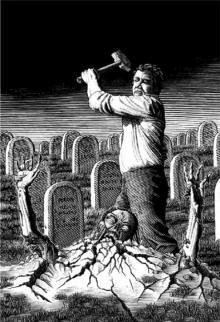 Dawn of the Dreadfuls
Dawn of the Dreadfuls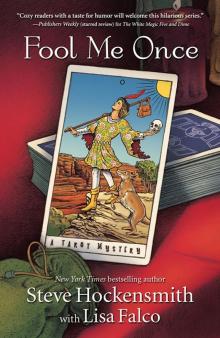 Fool Me Once: A Tarot Mystery
Fool Me Once: A Tarot Mystery The Hungry
The Hungry Naughty: Nine Tales of Christmas Crime
Naughty: Nine Tales of Christmas Crime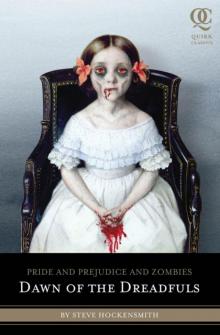 Pride and Prejudice and Zombies: Dawn of the Dreadfuls papaz-1
Pride and Prejudice and Zombies: Dawn of the Dreadfuls papaz-1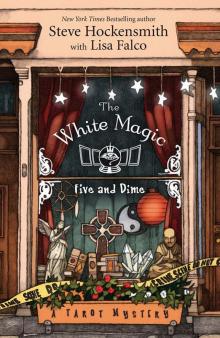 The White Magic Five & Dime (A Tarot Mystery)
The White Magic Five & Dime (A Tarot Mystery)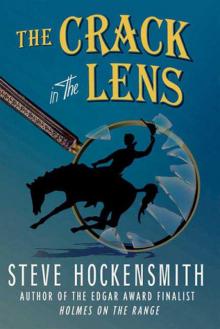 The Crack in the Lens
The Crack in the Lens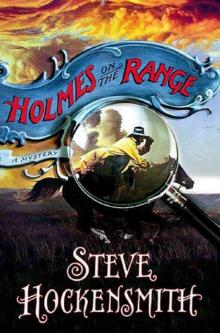 Holmes on the Range
Holmes on the Range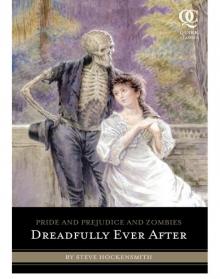 Dreadfully Ever After
Dreadfully Ever After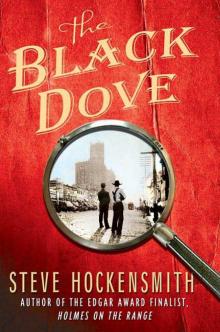 S Hockensmith - H03 - The Black Dove
S Hockensmith - H03 - The Black Dove On the Wrong Track
On the Wrong Track Naughty-Nine Tales of Christmas
Naughty-Nine Tales of Christmas World's Greatest Sleuth!
World's Greatest Sleuth!